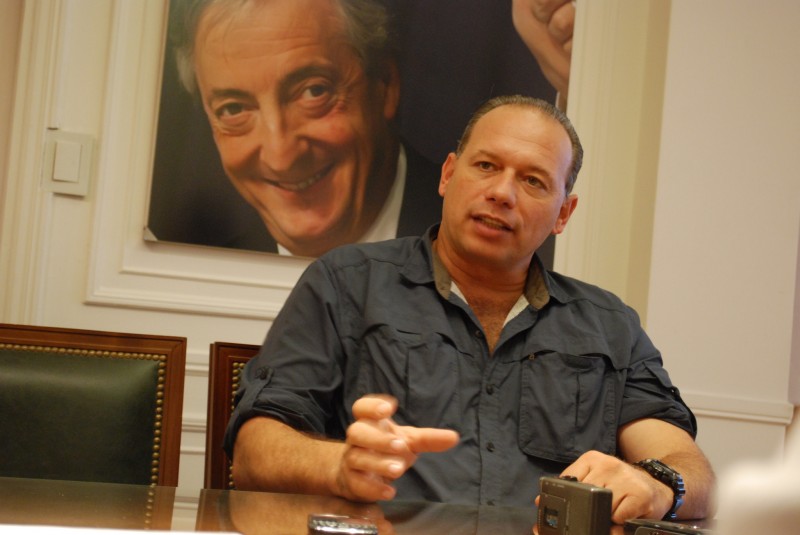 [1]
[1]Argentina's Security Secretary Sergio Berni. Image from Security Ministery Flickr account under CC BY-NC-ND 2.0.
A politician is facing accusations of xenophobia over his comments on crime committed by foreigners in Argentina, where insecurity is increasingly a concern.
Debates about insecurity are becoming more frequent among residents, media and officials, although Argentina has a low rate of violent deaths (5.5 homicides per 100,000 inhabitants) compared with its regional neighbors, according to a report from United Nations Developoment Program [2] (UNDP). However, the real dimension of the problem is difficult to measure since Argentina stopped publishing official crime statistics in 2009.
A common theme among many of the discussions has been the idea that a large portion of the crimes are committed by foreigners, which has turned the debate into a question of expelling immigrants or not.
Argentine Security Secretary Sergio Berni weighed in on the issue rather controversially when he said in October 2014, as relayed by news website Infobae [3]:
Estamos infectados de delincuentes extranjeros
His remark was met with accusations of xenophobia. Sites like the blog Seminario de Teoría Constitucional y Filosofía Política [4] (Seminar on Constitutional Theory and Political Philosophy) focused on what needs to be done legally, while the blog from Lucas Raffa [5] reviewed the underlying issues behind crime:
El tema tiene unos puntos claves de los que no se habla:
- Si el tema es que no los atrapás, el problema [eres tú] policía, no los extranjeros.
- Si el tema es que los atrapás pero no van presos, el problema es tu ley y proceso, no los extranjeros.
- Si el tema es que son ilegales, el problema es la protección de tu frontera.
- Si el tema es que son reincidentes y siguen entrando al país a robar, el problema es que no cumplís con la ley migratoria.
The topic has some unspoken issues:
- If the issue is that you don't catch them, the problem (is you) police, not the foreigners.
- If the issue is that you catch them but don't send them to prison, the problem is your law and process, not the foreigners.
- If the issue is that they are undocumented, the problem is how you protect the country's borders
- If the issue is that they are repeat offenders and keep coming back to the country to steal, the problem is that you aren't complying with immigration law.
And therefore concluded:
El problema es el Estado, no los extranjeros. Y este país, para el que no tenga memoria, al igual que Estados Unidos, se formó con extranjeros.
The blog Peruanos en Argentina (Peruvians in Argentina) argued that it isn't new for the Argentine government to put the blame on other people [6] for not taking care of its own responsibilities. Paraguay Ñane Retá [7], a newspaper for the Paraguayan community in Argentina, published crimes statistics [8] to shed some facts on the debate:
El año pasado, la Corte Suprema de Justicia presentó un relevamiento sobre homicidios dolosos [9] en Capital Federal y en los departamentos judiciales de San Martín y La Plata, con datos referidos a 2010 y 2011. En cuanto a los victimarios, ese informe indicó que en Buenos Aires el 15% de los imputados es extranjero (paraguayos, 7% y peruanos, 3%). En La Plata, el 10%; en San Martín, el 4%.
Meanwhile, the Argentine National Institute Against Discrimination, Xenophobia and Racism (INADI [10]) called for public officials to be choose their words carefully when they characterize insecurity in the country:
Hay que ser cuidadosos al expresar públicamente desde el Estado hechos y situaciones tan complejas como son las que giran alrededor de la seguridad, porque mas allá de la intencionalidad con la que se manifiestan esos dichos, lo que termina sucediendo es que se legitiman discursos y prácticas racistas y xenófobas de sectores que, no casualmente, son los mismos que critican los avances en materia de Derechos Humanos desde 2003 hasta esta parte.
According to news agency Telam [11], Berni defended himself [12]from those who criticized his position as xenophobic, saying he was not drawing conclusions, but simply doing his job of “telling society” what is happening.